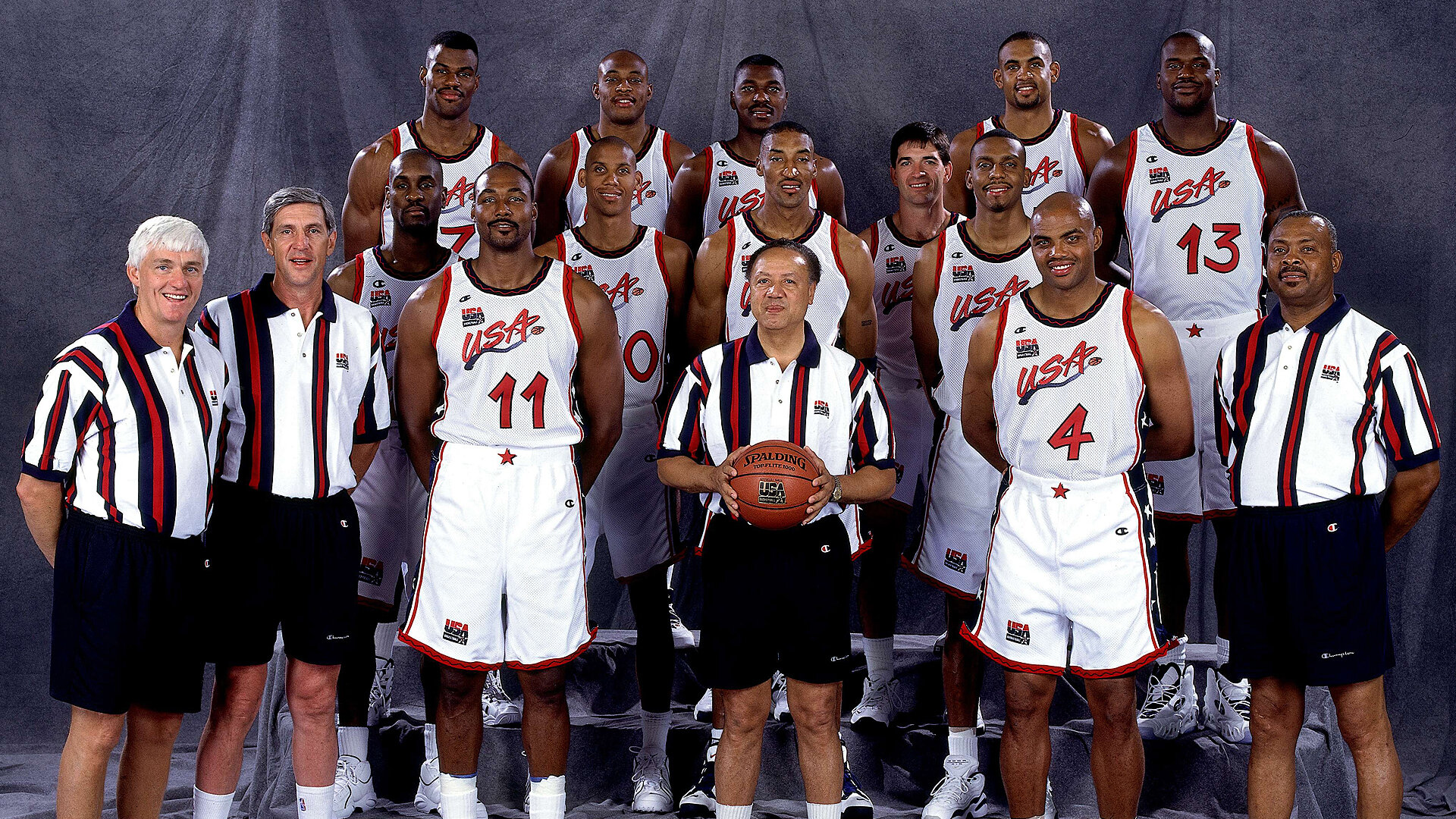Day 16: Kerri Strug, Michael Johnson, and the Dream Team III
The 1996 Summer Olympics were the first summer Olympic games I paid attention to. Just two years earlier, the 1994 Winter Olympics taught me that not only was Lillehammer fun to say, it seemed like a really neat place. I have very specific memories of watching those winter games with my mom. As southern folk who see two feet of snow as a blizzard worth memorializing in a school year book, it is odd that we would care for the winter Olympic games at all, but we did. The summer games were coming to Atlanta and mom and I once again broke out my light-up globe in an effort to identify every country mentioned in each event. We often failed. That globe still had the Soviet Union on it.
The 1996 Summer Olympics in Atlanta were a really big deal. On July 19, thousands of on site spectators and millions of world wide watchers looked on as athletes from all over poured into the stadium. President Clinton punctuated the opening ceremony and Muhammed Ali was given the distinct honor of lighting the Olympic torch that would burn bright in Atlanta over the next two weeks plus. That’s the interesting thing about the Olympic games, they are barely two weeks long yet seem to take up a summer’s worth of memories. The scale of the summer games was all new to me, much larger than the winter ones from before, and a spectacle larger than I could imagine. The infrequency of the Olympics keeps the event in such lustrous regard. The World Series, the Super Bowl, the NBA World Championship, and the Stanley Cup are all yearly events that mean a little less to me as the years go. But the Olympics are still special and worth my attention.
“In the game we take you to war
You ain’t seen nothin’ like this before
If I hit ‘em high, hit ‘em high, hit ‘em high
And you hit ‘em low, hit ‘em low, hit ‘em low”
As far as events go, at first I was most interested in what I knew about: basketball. I had never swam, ran, lifted, jumped, or landed anything successfully in my life but I had shot a basketball. The ‘92 American Dream Team was mythical to me. At only 7 years old at the time, I had no interest in it. By 1996 that had changed and I was consumed by that team’s unbelievable roster featuring Charles Barkley, Anfernee Hardaway, Grant Hill, Karl Malone, Reggie Miller, Hakeem Olajuwon, Shaq, Gary Payton, Scottie Pippen, Mitch Richmond, David Robinson, and John Stockton. As expected, the team went undefeated and knocked off Brazil, Australia, and Yugoslavia in the tournament. Unsurprisingly, none of the games were even close and the matches played out more like a Harlem Globetrotters exhibition rather than a high stakes world championship event. That was fine with me. USA! USA!
While the professional basketball players drew my attention toward the ‘96 Olympics, I was slow to come around paying attention to other events. As it turns out, track and field just doesn’t do it for me but a good story does. At age 11, I was willing to chant for the red, white, and blue in any event they were in and even a few they weren’t but eventually I really started to appreciate the human moments the Olympics always seems to introduce.
One of those moments was with Kerri Strug, a US gymnast. She became a household name that even still permeates trivia and pop-culture references to this day all because of one harrowing moment. In prior Olympics, the Soviets dominated team gymnastics events and those events had never before been won by the United States. In 1996, the US was competitive with Russia and even carried a lead into the final rotation. It was still possible for Russia to win and take the gold if the US women collapsed and holy shit, they almost collapsed. The first two US gymnasts landed but not cleanly and, adding to the drama, another fell twice and registered a poor score. Strug would be the last to vault for the US team.
On her first attempt she didn’t rotate far enough and fell, injuring her ankle. It didn’t look good. She grimaced with pain, she limped away, and a medical team responded to her. It was starting to look like the US team choked and the Soviets could steal this one away. But, due to how gymnastics is scored, Strug needed to land a second vault and this time on her feet in order to mathematically clinch the gold. Could she even walk? Yes. She limped to the runway and made her second attempt and landed on both feet, briefly. Her face anguished, the crowd silent. She then collapsed to her knees and required assistance to be carried off but she did enough. The US won. Perhaps the most memorable moment of those ‘96 Olympics as far as triumph goes is the image of her coach carrying her, with her later diagnosed third-degree-lateral-sprain-and-tendon-damaged-ankle preventing her from walking, to the podium to receive her medal. She was unable to perform for the rest of the events that year, but she had left her mark. Even though the Olympics took place over the summer, when I entered 6th grade a couple months later, Kerri Strug was still a schoolyard name all of the kids knew.
All of the kids also knew about Michael Johnson. There wasn’t a Wheaties box, shoe commercial, or otherwise health related endorsement that didn’t have Michael Johnson sprinting on it for months after the Olympics were over. The sprinter grabbed two golds in the ‘96 games, one for the 400m and another for the 200m. It wasn’t just the golds he grabbed either, he set the Olympic record in those events. To this day he is the only male athlete to win both the 200 and 400m events in the same games and he is the only man to ever successfully defend the title, winning the gold yet again in 2000’s Summer Olympics in Sydney.
There are plenty of other American athlete stories to tell from the memorable ‘96 Olympic games. There’s Andre Agassi’s gold, the US women’s basketball team gold, Mia Hamm and the women’s soccer team, Gail Devers, Lindsay Davenport, Carl Lewis, Tom Brands, Shannon Miller, and Kendall Cross. All names I recognize and remember because I became consumed with the Olympics and the frenzied, non-stop press surrounding it.
There was something else that happened at the Olympics that year. We’ll get to that soon.






